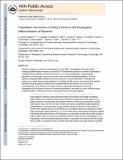Population Genomics of Early Events in the Ecological Differentiation of Bacteria
Author(s)
Shapiro, B. J.; Friedman, J.; Cordero Sanchez, Otto Xavier; Preheim, Sarah Pacocha; Timberlake, Sonia Crago; Szabo, Gitta; Polz, Martin F.; Alm, Eric J.; ... Show more Show less
DownloadAlm_Population genomics.pdf (498.9Kb)
OPEN_ACCESS_POLICY
Open Access Policy
Creative Commons Attribution-Noncommercial-Share Alike
Terms of use
Metadata
Show full item recordAbstract
Genetic exchange is common among bacteria, but its effect on population diversity during ecological differentiation remains controversial. A fundamental question is whether advantageous mutations lead to selection of clonal genomes or, as in sexual eukaryotes, sweep through populations on their own. Here, we show that in two recently diverged populations of ocean bacteria, ecological differentiation has occurred akin to a sexual mechanism: A few genome regions have swept through subpopulations in a habitat-specific manner, accompanied by gradual separation of gene pools as evidenced by increased habitat specificity of the most recent recombinations. These findings reconcile previous, seemingly contradictory empirical observations of the genetic structure of bacterial populations and point to a more unified process of differentiation in bacteria and sexual eukaryotes than previously thought.
Date issued
2012-04Department
Massachusetts Institute of Technology. Department of Biological Engineering; Massachusetts Institute of Technology. Department of Civil and Environmental EngineeringJournal
Science
Publisher
American Association for the Advancement of Science (AAAS)
Citation
Shapiro, B. J., et al. "Population Genomics of Early Events in the Ecological Differentiation of Bacteria." Science 6 April 2012: Vol. 336 no. 6077 pp. 48-51.
Version: Author's final manuscript
ISSN
0036-8075
1095-9203